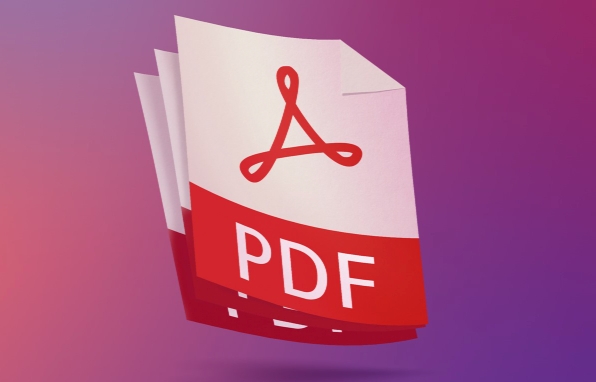The steps to create a directory in Adobe Acrobat are as follows: 1. Ensure the document structure is clear and use hierarchical titles; 2. Use the bookmark function to manually add and set the target position; 3. If the document has structural information, bookmarks can be automatically generated through the outline; 4. Adjust the bookmark hierarchy and appearance to improve readability. As long as the preliminary structure is fully prepared, a directory that can be clicked and redirected can be efficiently generated.

Creating a directory in Adobe Acrobat is not difficult, but many people may not know where to start at the beginning. In fact, as long as the document itself is structured clearly and the bookmark function is well used, a directory that can be quickly generated that can be clicked and redirected can be quickly generated.

Ensure the document structure is clear
To generate a practical directory, the first step is to make sure that the PDF itself has a good structure. In other words, your document needs to have clear hierarchical information such as chapter titles and subsection titles. If you export PDFs from Word or InDesign and use styles (such as "Title 1" or "Title 2"), this information is usually retained and can be recognized as structural data in Acrobat.

If there is no structure information, you can only create the directory manually. Although it can be done in this case, it will be less efficient and suitable for files with few pages or small changes in content.
Use the bookmark function to create a directory manually
The Bookmarks panel of Adobe Acrobat is your main tool for creating catalogs. After opening the PDF, find the Bookmarks panel in the right sidebar (if not, you can open it in View > Show/Hide > Navigation Pane > Bookmarks).

Next, you can start bookmarking:
- Click the start page of a chapter, and then click the " " button in the upper right corner of the Bookmarks panel to create a new bookmark.
- Name the bookmark, such as "Introduction to Chapter 1".
- After creating the name, you can right-click the bookmark, select "Set Target Location", and then locate the specific page and location of the chapter.
- Repeat this process and bookmark all major chapters.
The advantage of this is that the directory structure can be completely customized, and the disadvantage is that it takes a bit of time to set it up page by page, especially long documents.
Automatically generate directory (requires structured PDF)
If your PDF is structured (that is, the document exported with style mentioned above), there is a chance to automatically extract the outline to generate the directory. The method is as follows:
- Open Acrobat Pro and go to Tools > Organization Pages.
- Then click "Export Bookmark" or see if there is an outline structure already exists.
- If the system detects a structure, titles at each level will usually be automatically listed in the Bookmarks panel with a jump link.
This method saves time and effort, but the premise is that the document must have structural information. If the original file does not use style layout, this step will not be useful.
Add some details: Adjust bookmark hierarchy and appearance
After creating the directory, you may find that the bookmarks are all tiled and have no sense of layering. At this time, they can be adjusted by dragging the bookmarks. For example, drag "Section 1.1" below "Chapter 1 Introduction" and move it slightly to the right, and it will become a sub-bookmark, showing it indented.
In addition, you can right-click the bookmark and select "Properties" to modify the color, bold or italics to make the directory look clearer and easier to read.
Basically these are the operations. The entire process is not complicated, but what is easy to ignore is the preparation of the early document structure. If this step is done, the subsequent steps will be much easier.
The above is the detailed content of How to create a table of contents in Adobe Acrobat?. For more information, please follow other related articles on the PHP Chinese website!

Hot AI Tools

Undress AI Tool
Undress images for free

Undresser.AI Undress
AI-powered app for creating realistic nude photos

AI Clothes Remover
Online AI tool for removing clothes from photos.

Clothoff.io
AI clothes remover

Video Face Swap
Swap faces in any video effortlessly with our completely free AI face swap tool!

Hot Article

Hot Tools

Notepad++7.3.1
Easy-to-use and free code editor

SublimeText3 Chinese version
Chinese version, very easy to use

Zend Studio 13.0.1
Powerful PHP integrated development environment

Dreamweaver CS6
Visual web development tools

SublimeText3 Mac version
God-level code editing software (SublimeText3)

Hot Topics
 How to transfer an Adobe Acrobat license to a new computer?
Jul 04, 2025 am 12:01 AM
How to transfer an Adobe Acrobat license to a new computer?
Jul 04, 2025 am 12:01 AM
To transfer the Adobe Acrobat license to a new computer, you must first log out on the old device and release the activation permission, and then complete the activation with the new computer login account. The specific steps are: 1. Open Acrobat on the old computer and click on the avatar or "Help" > "Log out" to log out; 2. Download and install Acrobat for the new computer and log in with the original account to automatically identify the license; 3. If the activation fails, check the network, clear the cache, unbind the old device through the Adobe account page, or contact customer service to solve the problem. The key point is to ensure that the old device has been logged out, clear the local cache and update the online device list before the migration can be completed smoothly.
 How to create a custom brush in Photoshop
Jul 08, 2025 am 01:01 AM
How to create a custom brush in Photoshop
Jul 08, 2025 am 01:01 AM
The steps to create a custom brush in Photoshop are as follows: 1. Select a pattern with clear edges and suitable for brushes, such as hand-painted textures or photo parts, and adjust it to the appropriate size; 2. Use the "Magic Wand Tool" or "Quick Selection Tool" to remove the background to ensure that the pattern is in an independent selection; 3. Create a basic brush through "Edit > Define Brush Presets"; 4. Adjust the parameters such as "Shape Dynamic", "Scatter", "Text" and "Transfer" in the "Brush" panel to make the strokes more natural; 5. Finally, click "Save As Brush" to save as a .abr file for convenience of subsequent use and sharing.
 How to use the quick selection tool in Photoshop
Jul 06, 2025 am 12:01 AM
How to use the quick selection tool in Photoshop
Jul 06, 2025 am 12:01 AM
Photoshop's quick selection tool is suitable for selecting areas with similar colors and clear boundaries. The usage methods include: 1. Find and activate the tool, right-click or long-press to switch or press the shortcut key W to ensure that the layer is unlocked; 2. Adjust the brush size, combine the Alt or Option key to switch the selection mode, Shift key to add selection, and improve accuracy through the option bar setting sampling method; 3. Use the "Select the Subject" function to assist in selection, and then manually optimize edge details, especially suitable for portraits or product images.
 How to recover a corrupted AutoCAD file?
Jul 09, 2025 am 01:16 AM
How to recover a corrupted AutoCAD file?
Jul 09, 2025 am 01:16 AM
When AutoCAD file is corrupted, you can take the following steps to try to restore: 1. Check the automatic backup of the file, check whether there is a .bak or .sv$ file in the folder where the original .dwg file is located, and rename the .bak file to .dwg to open it; 2. Use the RECOVER command to try to repair the file, and if it fails, use the -OPEN command to open the file for partial recovery; 3. Use third-party tools such as DataNumenDWGRepair, RecoveryToolboxforDWG, etc. to deal with seriously damaged files. To prevent future damage, you should save regularly and use "Save As" to refresh the file structure, keep the software updated, avoid saving through network drives, enable automatic save and set up
 How to fix remote desktop connection issues
Jul 08, 2025 am 01:03 AM
How to fix remote desktop connection issues
Jul 08, 2025 am 01:03 AM
Remote Desktop connection problems can be checked through the following steps: 1. Check the network and firewall settings to ensure that the TCP3389 port is open; 2. Confirm that the remote desktop function is enabled and supported by non-home version systems; 3. Verify user permissions and belong to the "RemoteDesktopUsers" group or administrator; 4. Handle black screen or lag, adjust the display options or restart the remote computer. Check them one by one in order, and most problems can be solved.
 How to remove password protection from a PDF in Adobe Acrobat?
Jul 05, 2025 am 12:36 AM
How to remove password protection from a PDF in Adobe Acrobat?
Jul 05, 2025 am 12:36 AM
To remove PDF password protection, use Adobe AcrobatPro and have the document owner password. The steps include: 1. Open Adobe AcrobatPro and select a password-protected PDF file; 2. Enter the correct owner password; 3. Go to "Tools" > "Protection" > "Encryption" > "Remove Security"; 4. Click "OK" in the pop-up window to confirm the removal. If AcrobatPro is not available, you can ask others for assistance or use third-party decryption tools, but you need to pay attention to privacy risks. Common problems include invalid password, grayed out security settings, and prompting for passwords after removal. The solution is to check password input, try to convert file formats, or update software versions. If it cannot be resolved, please contact A
 How to use the magnetic lasso tool in Photoshop
Jul 04, 2025 am 01:00 AM
How to use the magnetic lasso tool in Photoshop
Jul 04, 2025 am 01:00 AM
The magnetic lasso tool is suitable for images with obvious edge contrast. The key points include: 1. Use the shortcut key L or select the tool from the tool group. After clicking the starting point along the edge of the object, slowly move the mouse, and the tool will automatically absorb and add anchor points; 2. In terms of parameter settings, the width is recommended to be set to 10~30, and the edge contrast is default. The higher the frequency, the more anchor points; 3. In actual application, other tools can be replaced in the blurred edges. Zooming the image will help with accurate selection. If necessary, the anchor points can be adjusted manually. Mastering these skills can effectively improve the efficiency of the selection.
 How to get Photoshop for free
Jul 12, 2025 am 12:34 AM
How to get Photoshop for free
Jul 12, 2025 am 12:34 AM
Adobe Photoshop does not have a permanent free version, but can be legally used in the following ways: 1. The official website provides a 7-day free trial, complete functions but automatic renewal is required; 2. Use a simplified version based on the browser (Beta), which supports basic editing functions; 3. Students or teachers can obtain a full-featured version through the school education plan; 4. Consider alternative software such as GIMP, Photopea, Krita or Canva Pixlr to meet daily needs. The above methods can meet the needs of different users and ensure legal and compliant use.






